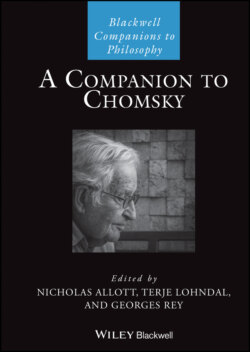Читать книгу A Companion to Chomsky - Группа авторов - Страница 73
7.1.2 What Do They Know and When Do They Know It?
ОглавлениеFew, if any, humans behave like the ideal grammarians that these theories – even Harris's – purport to describe. First there is the question of what babies and toddlers “know” about language despite being unable to understand or produce much of the speech to which they are being exposed. The psychological literature, as it looked when I first examined it, described at most what children actually produced, as a function of age: so and so many words at age one, more at age two, and so forth; one‐word utterances at first (“Momma”) and two at a time later on (“Mommy sock”). In the early sixties, with the advent of Chomsky's first writings on the psychology of language, psychologists began to write little “grammars” of the child's primitive speech (see, e.g. Brown et al. 1968; Rodd and Braine 1971). But what is the status of these descriptions? Is children's speech, thus chronicled and organized, a reasonable proxy for what they know about their language – or about Language?
With Elizabeth Shipley, my brilliant colleague in mathematical psychology, I set out to probe the toddlers further, asking them, in effect, “Is the following sentence grammatical in your infant dialect?” To be clearer, we tried to find out if Mommy sock was an output fairly representing their linguistic knowledge at time of test. After all, when linguists try to build grammars, they never simply use actual speech as the data, but rather, or in addition, use direct or indirect judgments of grammaticality, aiming to get at what constitutes “your language,” discarding speech errors, and so forth.
Our finding, in brief (Shipley et al. 1969), was that every kid who spoke in two‐word sentences like Throw ball acted as if the same two‐word sentences from the mother to them were abnormal – they didn't obey those commands, but acted as if something bizarre had happened, whereas grammatical sentences like Throw me the ball, they simply obeyed.
This raises a second question. It may be [and Henry Gleitman and I showed, at some length (Gleitman and Gleitman 1979)] that you can't get these judgments in any coherent or full way from even the mature speakers who, if anybody, are the targets that the theory of grammar is, or should be, designed to organize and explain. Most people can't even tell you how black birdhouse, blackbird house, and house bird‐black differ in their meaning (that is, in the paraphrases they license). A question we raised concerned how a grammar built from judgments of one population – let us say, literary or otherwise book‐wise speakers of some standard dialect – can be used as the empirical basis for building a theory of all native users. Well, we did convince ourselves, in the end, that judgment‐giving itself, while useful if available, was not the only relevant source of data.
Yet a variety of uses of language, many of them important, are well correlated with the ability to give linguistic judgments – that is, to contemplate language more or less explicitly, even consciously. As we later showed with several other collaborators, including Paul Rozin and Kathy Hirsh‐Pasek (Gleitman and Rozin 1977; Hirsh‐Pasek et al. 1978), there is a cluster of skills including learning (or inventing!) an alphabetic writing system, making and understanding puns, and the like that are predicted by this “metalinguistic awareness” (Gleitman and Gleitman 1979). Something like these early generalizations is reminiscent of recent studies and approaches now called executive function, which also attempt to describe and explain certain users' access to aspects of their own cognitive functioning.
